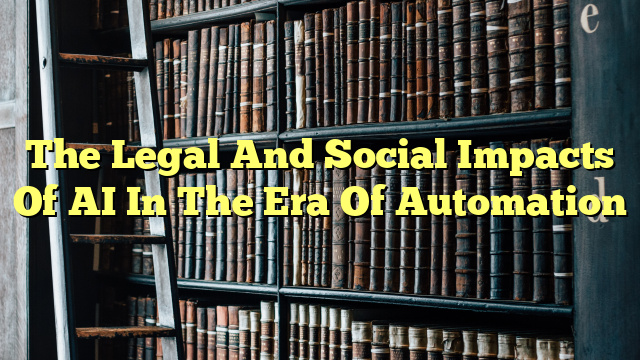As Artificial Intelligence (AI) becomes a prevalent feature of our daily lives, it is important to consider the legal and social impacts of AI and automation on society. AI has the potential to bring great benefits to society, but it also comes with a range of ethical, legal, and social issues. This article explores the legal and social impacts of AI in the era of automation. It looks at the implications for privacy, security, employment, and more.
What is the Legal Impact of AI?
The legal impacts of AI depend on how it is used and what type of data it is processing. In some cases, AI can be used as a tool to automate certain processes, such as collecting and analyzing large amounts of data. This can have significant implications for privacy, as AI can be used to collect personal data without individuals’ consent or knowledge. Similarly, if AI is used to automate decision-making processes, such as in credit scoring algorithms, this could lead to discrimination or unfair outcomes.
The legal implications of AI also depend on which regulations are in place. For example, in the European Union, the General Data Protection Regulation (GDPR) requires companies to be transparent about how they use AI and to comply with data protection laws. In the US, the Federal Trade Commission has put in place guidelines that require companies to be transparent about how they use AI and to protect consumers’ privacy.
What are the Social Ethical and Legal Issues of AI?
The ethical and legal issues of AI are closely related to its implications for privacy and security. One of the main ethical concerns is that AI can be used to violate people’s privacy, as it can collect and process large amounts of personal data without individuals’ knowledge or consent. Similarly, AI can be used to automate decision-making processes, such as in credit scoring algorithms, which could lead to unfair outcomes or discrimination.
Another ethical issue is that AI can be used to automate certain processes, such as manufacturing and driving, which could lead to a loss of jobs. This has implications for employment and social welfare, as people could find themselves out of work and unable to find new jobs. Finally, AI can be used to target individuals with certain types of advertising or messages, which could have implications for free speech and the integrity of the political process.
What are the Social Impacts of AI?
The social impacts of AI depend on how it is used. AI has the potential to bring great benefits to society, such as improved efficiency, increased safety, and better decision-making. It can also be used to automate certain processes, such as manufacturing and driving, which could lead to a loss of jobs. This could have implications for employment and social welfare.
Similarly, AI can be used to target individuals with certain types of advertising or messages, which could have implications for free speech and the integrity of the political process. Finally, AI can be used to collect personal data without individuals’ consent or knowledge, which could lead to breaches of privacy.
What are 3 Negative Impacts of AI on Society?
1. Loss of Jobs: AI can be used to automate certain processes, such as manufacturing and driving, which could lead to a loss of jobs. This could have implications for employment and social welfare.
2. Breaches of Privacy: AI can be used to collect personal data without individuals’ consent or knowledge, which could lead to breaches of privacy.
3. Manipulation of Political Process: AI can be used to target individuals with certain types of advertising or messages, which could have implications for free speech and the integrity of the political process.

